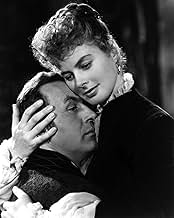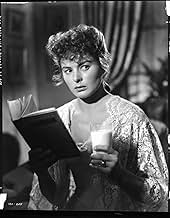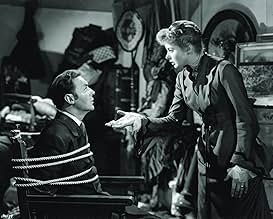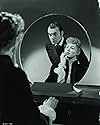Anos depois que sua tia foi assassinada em sua casa, uma jovem mulher retorna à casa com seu novo marido. No entanto, ele tem um segredo que fará qualquer coisa para proteger, mesmo que isso... Ler tudoAnos depois que sua tia foi assassinada em sua casa, uma jovem mulher retorna à casa com seu novo marido. No entanto, ele tem um segredo que fará qualquer coisa para proteger, mesmo que isso signifique enlouquecer sua esposa.Anos depois que sua tia foi assassinada em sua casa, uma jovem mulher retorna à casa com seu novo marido. No entanto, ele tem um segredo que fará qualquer coisa para proteger, mesmo que isso signifique enlouquecer sua esposa.
- Direção
- Roteiristas
- Artistas
- Ganhou 2 Oscars
- 10 vitórias e 7 indicações no total
- Miss Thwaites
- (as Dame May Whitty)
- Policeman
- (não creditado)
- Young Girl
- (não creditado)
- Cab Man
- (não creditado)
- Pedestrian
- (não creditado)
- Pedestrian
- (não creditado)
Avaliações em destaque
Great performances all round.
The actress -- who would soon become blacklisted after her marriage to Italian director Roberto Rossellini -- can convey every emotion and nuance of her character through her amazingly expressive eyes. Completely believable in George Cukor's Gaslight as a wife whose husband (Charles Boyer) is trying to make insane, Bergman can show you all her turmoil and emotional stress just by looking around.
The plot is simple, perhaps even arcane. A famous opera singer is murdered in London, leaving behind no motive, no clues, and Paula, the young niece who discovered the body. Paula is sent to Italy, where she, too, studies music, until she elopes with an older, dashing pianist (Boyer). He convinces her to move back to the exact same house where her aunt was murdered, where nothing has been changed in all those years. And, naturally, here is where the movie really begins.
Soon, her husband starts acting very strangely, and starts convincing her that she is very ill and unable to go out. Trapped in the house, alone with her husband, a somewhat-deaf cook, and a tart of a housekeeper, Paula soon starts to hear noises, see things, lose things, and even hide things. Or is she? Is she going mad? Or is her husband -- who she is supposed to love, honor, and obey -- making her mad?
The show is Bergman's to steal, and she does so with gusto, garnering an Oscar for her endeavor. With her performance, Bergman transforms the character of Paula Alquist from a weak, paranoid wimp of a wife into a woman struggling with her own identity and her role in marriage and society. Perhaps unintentionally, perhaps unwittingly, Bergman's Paula is a symbol and a superhero for all women trapped in an abusive marriage. Even today.
Granted, the story line is somewhat contrived, and one can't help but wonder how Paula never notices that her husband is completely evil BEFORE the marriage. Also, Joseph Cotten, as the Scotland Yard detective smitten with Paula's beauty, seems to come out of nowhere. Still, the acting prevails over the plot, and what better actor to come out of nowhere than Cotten? His charm and charisma make up for his character's two-dimensionality.
Although there are faults, Gaslight is an extraordinary film, generating its suspense not from an evil lurking in the shadows, but from the psychology of the mind itself. Perhaps one of the first "pure" psychological thrillers, Gaslight, just like Ingrid Bergman's eyes, contains the perfect blend of mystery, suspense, and beauty.
When Paula was younger, her aunt with whom lived with in Thornton Square in London was murdered by a strangler roaming the streets. Paula goes to stay in Italy, and some time later, meets Gregory. She and Gregory plan to marry, and after they do, they move to London, back to the exact house Paula lived in.
Not too long after, Paula starts to become "forgettful," as Gregory tells her. In fact, he tells her a lot of things...and she believes him. Then things she knows she had put somewhere or remembered doing seem nonexistent, and Paula is left to wonder if her sanity is in check. Then, many times, she starts hearing footsteps, and the gaslights are going down a lot. Is Paula going crazy, or is she being haunted by her dead aunt's spirit...or is it something far more sinister?
I liked this movie a lot. Ingrid Bergman and Charles Boyet were amazing. Bergman portrays her character's emotions to the point that you feel the same way she does. And Boyet is pure evil in this one. Many times watching this, I was thinking, "He is so terrible to her!" It was so psychological, how everything eveloped. The best scene in the whole movie took place at the reception, when Gregory tells Paula he lost his watch, and then finds it in her purse. Then she bursts into tears, and it was so absolutely amazing how the scene was pulled off. In fact, it was so subtle it was scary. You wouldn't expect a missing watch found in her purse to be such a big deal, but it is such a strong scene.
The one thing I didn't like about this otherwise nearly flawless movie was the climax. It was just too dull to me, and the only part I really liked was Paula's wicked sarcasm towards Gregory while they're in the attic. She truly did deserve the Best Actress Oscar for her acting, but nothing could mask the fact that the climax was just too weak. If it had a bit of a touchup, this movie would be perfect.
All in all, I recommend this without hesitation. It is absolutely amazing, and I could watch it again and still enjoy it, and that is quite rare for me. So, I recommend you find this wherever you can and give it a chance. It's a classic.
Você sabia?
- CuriosidadesWhen this movie was produced, MGM attempted to have all prints of the previous version, À Meia Luz (1940), destroyed. These efforts were ultimately unsuccessful, though the movie was rarely seen for the next few decades.
- Erros de gravaçãoWhen Paula finds the letter in her aunt's music score, Gregory crumples up the letter and jams it into his pocket. Later, when she finds the letter in Gregory's desk, it's neatly folded, with no evidence of crumpling.
- Citações
Paula Alquist Anton: If I were not mad, I could have helped you. Whatever you had done, I could have pitied and protected you. But because I am mad, I hate you. Because I am mad, I have betrayed you. And because I'm mad, I'm rejoicing in my heart, without a shred of pity, without a shred of regret, watching you go with glory in my heart!
- Cenas durante ou pós-créditosThe opening and closing credits are displayed over a background of a burning gaslight. If you look at the shadow on the wallpaper, you see a man strangling a woman.
- Versões alternativasExists in a computer-colorized version.
- ConexõesEdited into Hollywood: The Dream Factory (1972)
Principais escolhas
- How long is Gaslight?Fornecido pela Alexa
Detalhes
- Data de lançamento
- País de origem
- Idiomas
- Também conhecido como
- Luz que agoniza
- Locações de filme
- Empresa de produção
- Consulte mais créditos da empresa na IMDbPro
Bilheteria
- Faturamento bruto mundial
- US$ 2.391
- Tempo de duração1 hora 54 minutos
- Cor
- Proporção
- 1.37 : 1
Contribua para esta página




































